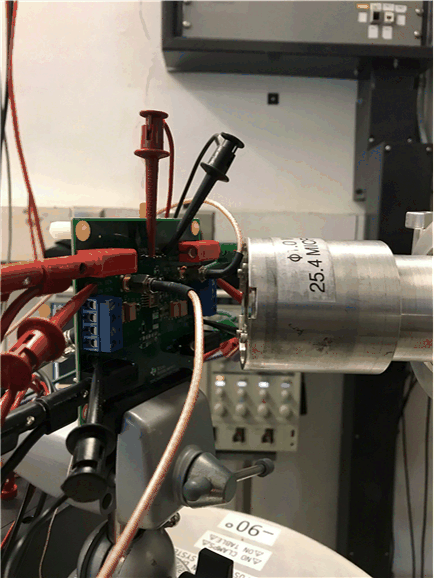SLAK024A January 2019 – March 2024 TPS73801-SEP
- 1
- Abstract
- Trademarks
- 1Overview
- 2Single-Event Effects
- 3Test Device and Evaluation Board Information
- 4Irradiation Facility and Setup
- 5Test Setup and Procedures
- 6Single-Event-Burnout (SEB) and Single-Event-Latch-up (SEL)
- 7SET Results
- 8Summary
- A Confidence Interval Calculations
- B References
- C Revision History
4 Irradiation Facility and Setup
The heavy-ion species used for the SEE studies on this product were provided and delivered by the TAMU Cyclotron Radiation Effects Facility (3) and the 88-Inch Berkeley Accelerator Space Effects (BASE) Facility (4)(5) using a superconducting cyclotron and advanced electron cyclotron resonance (ECR) ion source. At the fluxes used, ion beams showed good flux stability and high irradiation uniformity over a 1in diameter circular cross sectional area for the in-air station (TAMU). Uniformity is achieved by means of magnetic defocusing. The flux of the beam is regulated over a broad range spanning several orders of magnitude. For these studies ion fluxes of 105 ions / s-cm2 were used to provide heavy-ion fluences up to 107 ions / cm2.
For these experiments, Silver (47Ag), Copper (29Cu) ions were used. In some cases, angles were used to increment the LETEFF. LETEFF ranges from 28.9 to 43MeV-cm2 / mg. Kinetic energy ranges from 1.25 to 2.47GeV in the vacuum. Ion beam uniformity for all tests were in the range of 90% to 99%.
The DEM-SOT223LDO Demonstration Fixture test board used for the experiments at the TAMU facility is shown in Figure 4-1. Although not visible in this photo, the beam port has a 1mil Aramica ( DuPont®Kevlar®) 1in diameter window to allow in-air testing while maintaining the vacuum within the accelerator with only minor ion energy loss. The air space between the device and the ion beam port window was maintained at 40mm for all runs.
 Figure 4-1 Photograph of the TPS73801-SEP Evaluation Board Mounted in Front of the Heavy-Ion Beam Exit Port
Figure 4-1 Photograph of the TPS73801-SEP Evaluation Board Mounted in Front of the Heavy-Ion Beam Exit Port